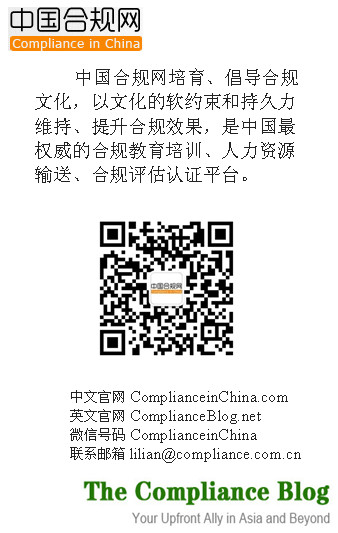On December 25, 2013, National Health and Family Planning Commission of China (the “Commission”) issued the Regulations on Establishing a System to Track Commercial Bribery Violations in the Purchase and Sale of Pharmaceutical Products (关于建立医药购销领域商业贿赂不良记录的规定) (the “Blacklisting System”). The Regulations took effect from March 1, 2014.
According to the Blacklisting System, each provincial office of the Commission shall make the rules for the concerned province to implement the Blacking System. Each provincial office shall release a blacklist at its official website in a timely manner and then report each blacklist (as well as those that are blacklisted) to the Commission within one month as of the release of the blacklist. The Commission shall then release the blacklist at its own official website.
The manufacturers, distributors or their representative institutions and individuals of pharmaceuticals, medical devices and medical consumptions (the “Blacklisted Parties”) shall be blacklisted if they offer money or valuables to the working personnel that procure or prescribe the pharmaceuticals, medical devices and medical consumptions and if:
(1) A Blacklisted Party is found guilty of the crime of paying bribes even if the Blacklisted Party is not criminally punished under an unserious circumstance;
(2) There is a bribery violation although the concerned prosecutor decides not to prosecute the bribery case of a Blacklisted Party under an unserious circumstance;
(3) The concerned Communist Party of China disciplinary or supervisory organization issues a penalizing decision on a Blacklisted Party;
(4) The concerned fiscal authority, administration for industry and commerce and food and drug administration issues an administrative punishment decision on a Blacklisted Party;
(5) And other situations where a Blacklisted Party is punished due to bribery.
A hospital or clinic shall provide an integrity clause in its contract with the concerned manufacturers, distributors and their representatives to alert them of the existence of the Blacklisting System.
For a period of two years, all government-funded public medical institutions or the medical institutions within such a blacklisting province will be prohibited from purchasing pharmaceutical products, medical devices and medical consumptions from a Blacklisted Party. The Blacklisted Parties shall be treated in disfavor in other provinces. Those which are blacklisted twice within five years shall be barred from doing any business with all of the government-funded public medical institutions or medical institutions within the whole country of China.
Despite all of the above “bad” news, there seems to be some good news. Blacklisting is not contagious between parent and subsidiary companies. In other words, if a parent company is blacklisted, its subsidiary company would not be blacklisted just because its parent company being blacklisted, and vice versa. The businesses that manufacture, distribute and sell pharmaceuticals and medical devices should consider dispersing their compliance risks – do not use one business to sell all of their products. In other words, don’t put all of the medical “eggs” into one blacklisted “basket”.






